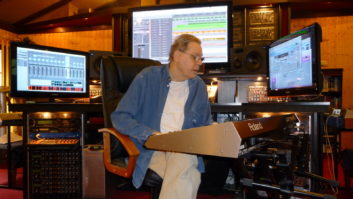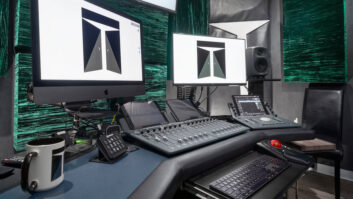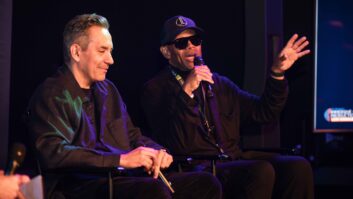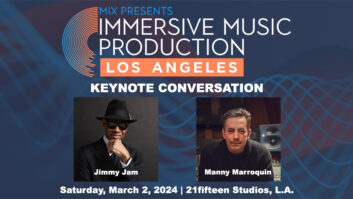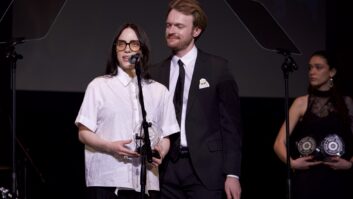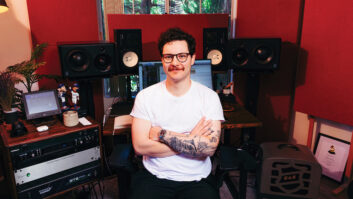Following nearly five years since its last album, Portland, OR-based Blind Pilot releases And Then Like Lions this month. A lot can happen in five years, and for principal songwriter Israel Nebeker, there was much to reflect on—including the end of a long-term relationship and the death of his father. The resulting recording, produced by Tucker Martine [My Morning Jacket, Neko Case], is a masterful quilt of songs dealing with reconciliation and courage. Pro Sound News spoke to Nebeker about the vast emotional spectrum of the new album, and the victory of having completed it.
ON LIFT HAPPENING:
The timing for this album was pretty crazy because once we had wrapped up touring the last album and were taking a break for me to write new songs, multiple people in the band had various family stuff come up. So at that point, it didn’t make sense for us to go into the studio. By the time we were all ready to go in and record, I already had about eight or nine songs written. They felt cohesive and relevant for that time in my life, so I thought it was time to do an album. And as far as the band was concerned, everyone had time again, so we went back into the studio.
ON ‘UMPQUA RUSHING’:
I didn’t know that was going to be the first track on the album, but it was the first song that I wrote in this batch of songs. It made sense to make it the lead track for a couple of reasons though: Firstly, because it is a nice beginning lyrically; it kind of opened the scene. And secondly, it kind of sets the storyline for the album. When I wrote that song, I was at the end of a long 13-year relationship and was trying to figure out how to let go. It can be hard, because there are all these memories tied up with your sense of self and your story in the world. So that song was sort of taking a look at all these intense memories, and realizing that now they still exist, but in a totally different, but important way.
ON THE STUDIO FLAG:
Growing up, my mom would sew up these flags and my father would paint them for me and my siblings. If we did something really great at home or school, they would hang a flag on the kitchen wall to celebrate — it was really neat if you got your flag up. After my dad died, I ran across this flag and I hung it up in my studio permanently to encourage me through the process the writing and to help finish this album. Having the flag around also reminded me to have a sense of playfulness during the process, because I was dealing with a lot of really heavy stuff. I wanted the album to invite conversation about the full spectrum of ideas.
ON ‘LINK LIONS’:
Aside from that first track, most of this album relates to my dad who was sick with cancer, and I wrote this song not too long after he died. Through the whole process of his being ill, one thing that really astonished me is how people can be totally unprepared for something to happen in their life—like death. And yet, people get ready and find the courage to face it. In the case of my father, I saw courage in the way that he fought his illness, but also in how he ultimately found the courage to let go and find peace with the idea of death. It blew my mind because he was such a fighter in life, and to reach this point at the end was really amazing to me. ‘Like Lions’ came to me after I saw that flag hanging in my studio. It was one of those songs that was kind of a gift—you don’t really know how it came so quick, but there it is.
ON ‘GEEKING OUT’:
Ryan, my partner in the band, has to keep me on task and focused in the studio, because I will geek out and keep asking the engineers and producers how everything works. But this distracts them and can take away from the time we have to record. I’ve always loved recording and studied it a little bit in college, and this was the first Blind Pilot album where I really took the plunge and acquired a few channels of gear to start recording at home. It ended up being a good working combination for us. We did most of the drums at Tucker’s, since they are hard to record and he does such a great job at it, and most everything else was recorded at my studio.
Almost everything I recorded went through an 1176—I really love that compressor. Also, Tucker loaned me an old Neve 1073 for a time, and we ran some things through that as well, which helped. As far as mics are concerned, I used a couple of AEA R84 ribbon mics and the stereo version, the R88, which is incredible. We used this in a lot of room recording scenarios as the main mic for the source. In most cases, it was positioned way across the room—about 10 or 15 feet away—and produced great results.
ON THE BIG EXHALE:
When the album was done, I felt a huge sense of relief and exhaled; the emotional connection to my work was a crazy thing. Now, we are gearing up to take it out on the road and looking forward to the album release. The live shows are kind of ‘part two’, because they really do inform the album—even for me. In the past, the way we played our songs live wasn’t so different to how we recorded them. But in this case, we recorded all the songs first without really thinking about the live sound. So it has been fun figuring out how to play everything live, and sometimes a challenge.
Jacques Sonyieux is a devout explorer of recording studios and the artists that occasionally inhabit them. Please send any tips or feedback to Jacques at: [email protected].
